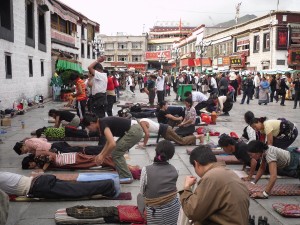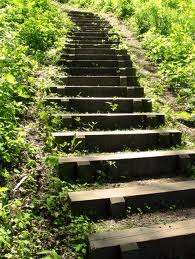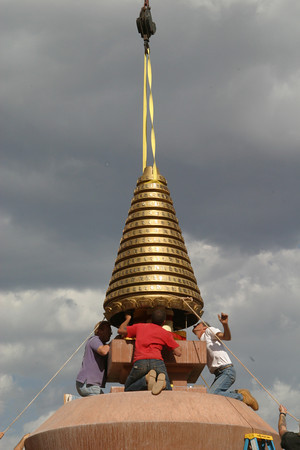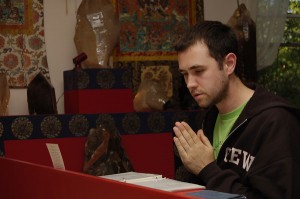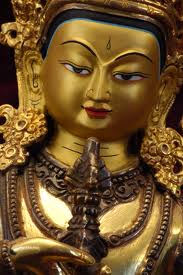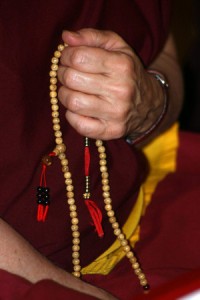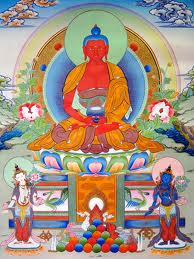
The following is an excerpt from a teaching by Jetsunma Ahkon Lhamo offered during a Phowa retreat:
Lord Buddha Amitabha is considered to be that one who once looked upon the suffering of sentient beings as he was becoming Buddha, as he was moving into his fully enlightened state, and saw the condition of sentient beings and began to cry. He grieved in a terrible way. It was a kind of grieving that one can only understand if one has tasted the food of enlightenment. If one has tasted enlightenment and then looked at the condition and suffering of sentient beings and truly seen the difference. There is no other grief like that. One cannot understand that kind of grief. It is unlike losing a loved one or even losing one’s own life. The grief that one will feel, having tasted the natural bliss, the natural birthright that is your true nature, and then watching that while that is so, it is also so that sentient beings are suffering horribly; watching that they are suffering uselessly and senselessly, and that because of their own ignorance they are making themselves suffer, and making their own mistakes, and that all that they would have to do is stop… There is no grief that is stronger or more complete than that: to know, from the vantage point of bliss, what sentient beings suffer. And so Lord Buddha Amitabha gave rise to the most profound bodhicitta, the most profound kind of compassion, a compassion that colored him, that dictated his method, a compassion that filled his intention, that became his intention. And the compassion was so strong and dominating that he made the most profound wishes. And he made those wishes, not as we would make wishes when we circumambulate the stupa, even when we make wishes with faith, but he made those wishes from the potency of his enlightened accomplishment. He had fully accomplished the view of non-distinction. He had fully accomplished the primordial wisdom view of equanimity. He had fully accomplished the ability to see the nature that is the nature of all sentient beings. He had fully accomplished the ability to see the lack of separation between oneself and others.
So when Amitabha looked to the plight of samsaric beings he began to cry, and it was his very tears, they say, that became the emanation which is Chenrezig, the Buddha that gave us the mantra ‘Om Mani Padme Hung,’ that keeps us from falling into the lower realms. That is how strong and how forceful his grief for sentient beings actually was. And so Lord Buddha Amitabha actually practiced in such a way as to set up a pureland called Dewachen, which is the easiest of all the pure lands to enter. It is meant to be a home, a welcoming place, a source of refuge for those of us who have met with samsara and have been so damaged and hurt and traumatized and deluded, and have continued so much in our own habitual tendency without any understanding of what samsara actually is, that we have become almost drunk beyond repair. Even though we too are that nature which is indistinguishable, that nature that is both the enlightened nature and the samsaric nature—while we too have that Buddha seed, yet we are so deluded and so wrapped up in the delusion, that while it is potentially so, you can also say it is almost impossible to expect or to hope that any of us might attain the other Buddha fields.
The other Buddha fields are associated with the kind of accomplishment that sentient beings are very rarely able to have. Lord Buddha Amitabha saw that, and he wept and grieved for those students who would be prevented, due to their circumstances. He was angry and would not accept that some sentient beings would be excluded because of their inability to practice. And he became extremely angry and extremely upset that some sentient beings would be excluded because of their ignorance and their slothfulness. He became extremely angry and extremely upset that some sentient beings would be excluded because they had not understood devotion. He became so upset with these things that he practiced in such a way that the very nature of his pureland is easy to enter. There is an ease of passage. And he made it his work from this point until all sentient beings are finished. This is his work from now until all of us are finished. Think of that. That he would be available constantly—and he doesn’t have office hours either, this is the great thing—he would be available constantly. I have office hours; Lord Buddha Amitabha does not have office hours. No, just kidding! Lord Buddha Amitabha has said that he will always be available for those beings that cry out for him. And literally, if, in the bardo, if you can remember to cry out for him once, and to call his name and to ask him to come and rescue you, surely he will come. He will not be able to ignore your voice. He will not be able to keep away from you. He will come.
The way he has set up his pureland, it will be very easy for you to follow only on that small cry. He’s like a mother. He’s so tuned to the cry of the babies that only the slightest whimper—only the slightest whimper, that’s no effort on your part—will invoke his great compassion. Therefore you can have confidence and faith and trust in Amitabha. He is as sensitive as your own mother was when she heard you breathing and whimpering in your crib when you were unable to fend for yourself. He’s like that. And furthermore, Lord Buddha Amitabha has also given us this practice and he has made his very body, his very nature, accepting of us to the degree that he is instrumental in the transference of our consciousness. So, while his body is subtle, while his body is pure, still somehow he connects with us in a mystical way that we cannot understand, and uses his very appearance, his very nature, as a vehicle to carry us into bliss. It is because he is so frightfully sad for the suffering of sentient beings, who have no hope and have no method, and have such strong habitual tendency that is weighing them down. He is the kindest, the purest. There is no other Buddha like him; he is completely unsurpassed. There is nothing and no one that can meet the kindness and the quality of Lord Buddha Amitabha. He should be considered your singular protector. You should think that his face is always turned toward you, and that all you have to do, like a little baby, is to follow the voice of your mother. A little baby learns very early on where the milk comes from and learns to follow the voice of its mother. And so in this way you should understand that the nectar of Lord Buddha Amitabha is all-pervasive, and it’s easily digested, even for those of us who have no will to take care of ourselves, or to befriend ourselves in a firm and disciplined way. Lord Buddha Amitabha is such that he will not only offer you the nectar and the milk of loving kindness, but he would also take it into his own mouth and digest it within his own body, and give it to you in that way, already digested. That is the kindness and the nature of Lord Buddha Amitabha. You can have complete faith and trust in him. He does not prefer Tibetans; he does not prefer any one kind. He has developed his practice to the point where he has eyes and ears and helping hands that extend in every direction. Right now he hears your voice; there is no sentient being that is separate from his hearing. Even if the tiniest bird were capable of calling out his name, even if the tiniest of creatures, the meanest of worms, has any connection with Lord Buddha Amitabha, he will try in some way to resonate with that creature so that they will have a chance. He is extremely active, extremely persistent in benefitting sentient beings. And when it comes to those of us who have practiced very little and are not very confident, he is our sole guide and mentor and hope when it comes to the time for our own death. So when we see ourselves moving our consciousness into Amitabha, we shouldn’t think that we are moving ourselves into something that is strange or separate or unfamiliar or unpleasant. We should think that we are going home. We should think that we are going to our own kind mother. We should think that we are going to our own truest heart. We should think that we are bathing in our own true nature. There is nothing foreign or unfamiliar, or strange or unfriendly about Lord Buddha Amitabha. He is your greatest hope. And if you remember no other image in your life, if you can never call out to your teacher, if you cannot do anything, if you are utterly and completely helpless when it comes to your practice, then please at least remember the kindness of Amitabha, because he will remember you. You should think like that.
Lord Buddha Amitabha has developed his practice so that he himself is the doorway to liberation. It is through him that we can pass, because he has made himself available. Coincidentally, it is also true that the practice of the wisdom of equanimity is often one of the first accomplishments that we can practice through meditation. Interestingly, when we sit in practice, simple meditation like shamatha, we can think that in that meditation it is possible to practice the wisdom of equanimity. We can begin even in a simple, quiet meditation like that, or just watching the breath, or simply letting the attention rest lightly on space, which is a very simple and very wonderful meditation that all of us should practice in order to help our minds not be so heavy and fixated on samsara the way they are. Keeping the attention just lightly resting on space, one then begins to awaken immediately to the wisdom of equanimity in a small and subtle way. And then gradually through that kind of practice one progresses. So, you see, even then, it is Lord Buddha Amitabha’s wish that that should be the most easy and most accessible method for us. That we should be able to firmly and easily—even those of us who are not excellent practitioners—move toward his nature. Move toward our nature. Move toward Dewachen. And it is through Lord Buddha Amitabha’s practice that he has reached out to us, through making his practice such that it is easy for us.
If you could understand the philosophy of burning the candle on both ends: What is happening on one side is also happening on the other side from our point of view, but in truth there are no two sides. It only appears that way. Someday, some scientist is going to come up with something in quantum physics that will be a mathematical formula that will help some of you to understand that this is how reality actually is. This is what actually is. That it is possible for Lord Buddha Amitabha to practice in such a way as to grease our wheels: to practice in such a way as to create a chute, in a way, that we can just sled down, in a sense. An easy access, a very open method, a very accessible method. That that could be a truth. And it could also be a truth when I say that perhaps in simple meditation one could easily develop the wisdom of equanimity. These are not two separate statements; they are the same statement. When you turn to Lord Buddha Amitabha, ultimately you are turning to your own kind nature. Ultimately you are turning to that to which you will awaken. Ultimately you are turning to that with which you will know again, or awaken to, become cognizant of, the connection. It is that strong connection that I am trying to describe. Coincidentally, that connection will probably be through the Phowa.Then we will know in our heart of hearts that Lord Buddha Amitabha has touched us, just as right now it is Lord Buddha Amitabha who is speaking to you. Because if it were not possible, if it were not so, the truth about how to die and how to be reborn would not be available in the world. It is Lord Buddha Amitabha, therefore, who speaks to you now through these teachings and these words, and you should follow without hesitation, with full confidence, and without question. This is only done because Lord Buddha Amitabha grieves that you should wander any longer in samsaric existence. His nature is that of equanimity; his nature is that of compassion. His nature is that of ultimate depth that we cannot fathom, the depth that is the true empty nature that is our nature. And it is Lord Buddha Amitabha upon whom we can rely as a bridge, a bridge that is easily crossed between ignorance and bliss.
That’s all that we have time for today. I promise you that towards the end of the retreat we will have more teaching, and will have more questions. I know that you have lots and lots of questions. Lots and lots of questions. But I’m hoping that some of your questions will be answered by end of the retreat. Also, I would like you to practice waiting on the kindness of your teacher. Waiting on the kindness of your teacher—that is a hard one. Students don’t want to do that. They don’t want to wait on the kindness of their teacher. They want to ask questions now because ‘we want to know, and we are important.’ You’re not practicing being important; you’ve already practiced that. You’re so darn important we don’t know what to do with you. You are so important we just don’t know what to do with you. You are already important; that has been accomplished. You have accomplished the mantra of importance; you’ve accomplished the mantra of ‘gimme, gimme, gimme.’ You have accomplished the mantra of ‘I think, I want,’ and now you are going to accomplish the mantra of devotion. So what you need to practice now is waiting on the kindness of your teacher, trusting in the kindness of your teacher. Looking for what is already there, rather than defining what you don’t know. I ask you questions, because in the bardo there will be no one to ask questions. You will have done it, or not, you see. That is what we are training for now, so it is appropriate for us to train in that way. Require of yourself to mature. Grow up. Pull yourself together. That’s the kind of thing we have to do in the bardo. Rely on that stability of mind. That’s what we’re training for now.
Copyright © Jetsunma Ahkon Norbu Lhamo All rights reserved
